Opinions
What to take from the Chauvin guilty verdicts?
We must continue to bend the arc of the moral universe to justice

Martin Luther King, Jr. said, “The arc of the moral universe is long but it bends toward justice.” The Derek Chauvin guilty verdicts bent it just a little bit more but there is a long way to go before there is equal justice and equal opportunity for Black and Brown persons in the United States. It is up to each of us to recognize that and commit to working toward that goal.
I joined with every decent person around the world and cheered as Chauvin was found guilty on all three counts. We knew he was guilty because we saw the video yet one never knows what a jury will do. We held our collective breath because the defense needed only one juror to believe their improbable story for a hung jury. Thankfully this jury was not taken in and instead focused on facts.
After the cheering stops each of us must ask what we can do to make a difference. This jury punished Chauvin for his crime but it did not change how police departments operate. We can only hope the verdict will get some police officers to think more about how they protect the community they are sworn to serve. We know the culture of policing must change. Some have defined change as officers seeing themselves as guardians of the public rather than as warriors. That won’t be easy.
A good friend, Lt. Brett Parson, retired DCMPD, is working to bring about change through a program called “Active Bystandership for law enforcement” (ABLE). A program described on the website as “law enforcement agencies that serve communities, recognizing that first responders must do a better job intervening when necessary to prevent their colleagues from causing harm or making costly mistakes.” There is research and experience that shows effective active bystandership can be taught. The Georgetown Innovative Policing Program attempts to prepare officers to successfully intervene to prevent harm and to create a law enforcement culture that supports peer intervention. The program’s aim is to “Prevent misconduct; Avoid police mistakes, and Promote officer health and wellness.”
We need to accept this verdict is only a beginning. Collectively and individually we need to continue the fight to rid our country of systemic racism. Each of us must take a long look inside ourselves and ask ourselves what we do that is racist, be it intentional or unintentional, and plan what we are going to do to change that.
I was both moved and educated to understand what it really means to be a Black man in our country when reading the recent personal and riveting column headlined, “Being Black in America is exhausting,” by someone I am honored to know, Jonathan Capehart. It is a column every white person needs to read and we must think long and hard about what we can do to make life less exhausting for our fellow Americans.
To be clear, I am not a proponent of ‘defunding police.’ I do believe we need police and judging by the impact that phrase had on the recent presidential and congressional elections, many agree with me.
But there is so much more involved than simply saying we shouldn’t defund police. What we must do with a sense of urgency is reform policing, retrain members of the force and rethink how police operate in our communities. Maryland became the first state in the nation to repeal its Police Bill of Rights. Other states need to follow. The D.C. Council did some of this in the emergency legislation it passed immediately following George Floyd’s murder. Then we must demand Congress pass the George Floyd Justice in Policing Act, which was first worked on in the Senate by Kamala Harris and Cory Booker (D-N.J.) as the Justice in Policing Act. Now as vice president, Harris is urging the Senate to pass it. The House of Representatives passed it in March and it’s now sitting in the Senate where it needs the support of at least 10 Republicans as long as the filibuster exists. Those of us with any sense of decency and commitment to justice need to work hard to convince 10 Republicans to get their heads out of their asses and face the reality our fellow Americans are dying because of the actions of some police.
To save lives we must continue to bend the arc of the moral universe to justice but cause it to bend faster so more people won’t die as they wait for it to happen.
Peter Rosenstein is a longtime LGBTQ rights and Democratic Party activist. He writes regularly for the Blade.
Greenland
The Greenland lesson for LGBTQ people
Playbook is the same for our community and Europeans

I understand my own geopolitical limits and don’t pretend to know how Europeans should respond to U.S. threats to seize Greenland or retaliate against anyone who opposes them. However, as I mentioned in March, it’s clear that for Europeans and LGBTQ+ people alike, hug-and-kiss diplomacy is over.
In practice, that means responding to the U.S. administration’s provocations with dialogue, human‑rights rhetoric, and reasoning may now be counterproductive. It looks weak. At some point, Europeans will have to draw a line and show how bullying allies and breaking international agreements carry a cost — and that the cost is unpredictable. On the surface, they have few options; like LGBTQ+ communities, they are very behind in raw power and took too long to wake up. But they still have leverage, and they can still inflict harm.
Maybe it is time for them to call the bluff. America has a great deal to lose, not least its reputation and credibility on the world stage. Stephen Miller and Pete Hegseth, with all their bravado, obviously underestimate both the short‑ and long‑term geopolitical price of ridicule. Force the United States to contemplate sending troops into an ally’s territory, and let the consequences play out in international opinion, institutions, and markets.
In the United States, LGBTQ+ communities have already endured a cascade of humiliations and live under constant threat of more. In 2025 our symbols and heroes were systematically erased or defaced: the USNS Harvey Milk was quietly renamed after a straight war hero, Admiral Rachel Levine’s title and image were scrubbed from official materials, Pride flags were banned from public buildings, World AIDS Day events were defunded or stripped of queer content, the Orlando memorial and other sites of mourning were targeted, the U.S. lead a campaign against LGBTQ+ language at the U.N., and rainbow crosswalks were literally ripped up or painted over. We cannot simply register our distress; we must articulate a response.
In practice, that means being intentional and focused. We should select a few unmistakable examples: a company that visibly broke faith with us, a vulnerable political figure whose actions demand consequences, and an institution that depends on constituencies that still need us. The tools matter less than the concentration of force — boycotts, shaming, targeted campaigning all qualify — so long as crossing certain lines produces visible, memorable costs.
A friend suggested we create what he called a “c***t committee.” I liked the discipline it implies: a deliberate, collective decision to carefully select a few targets and follow through. We need a win badly in 2026.
These thoughts are part of a broader reflection on the character of our movement I’d like to explore in the coming months. My friends know that anger and sarcasm carried me for a long time, but eventually delivered diminishing returns. I am incrementally changing these aspects of my character that stand in the way of my goals. The movement is in a similar place: the tactics that served us best are losing effectiveness because the terrain has shifted. The Greenland moment clarifies that we must have a two-pronged approach: building long-term power and, in the short term, punching a few people in the nose.
Opinions
Media obsess over ‘Heated Rivalry’ sex but ignore problem of homophobia in sports
4 major men’s leagues lack gay representation 13 years after Jason Collins came out

The mainstream media are agog over “Heated Rivalry,” the surprise hit HBO Max limited series about two professional hockey players who fall in love.
The show’s stars, Connor Storrie (Ilya) and Hudson Williams (Shane), are everywhere — red carpets, award shows, morning news and late night shows. Female fans lined up for hours to catch a glimpse of Storrie, who appeared on the “Today” show last week.
The interviews and coverage predictably involve lots of innuendo and snickering about the graphic sex scenes in the show. Storrie and Williams have played coy about their real-life sexual orientation, a subject of debate among some gay fans who would prefer they own their sexuality if, in fact, they are gay.
But the big issue ignored by the media that the show tackles is the crippling effect of homophobia and the closet — not just on professional athletes but on anyone who isn’t comfortable being out at work. And it’s a growing problem given the hostile Trump administration. Attacks on LGBTQ people and the roll back of DEI and related protections are driving many Americans back into the closet, especially in D.C.’s large federal workforce.
And the mainstream media seem totally unaware that there has never been an openly gay NHL player. Hell, there’s never even been a retired NHL player who came out.
It’s a sad fact that I would not have predicted 13 years ago when Jason Collins bravely came out publicly while playing in the NBA, the first male athlete in the big four U.S. sports to do so. His announcement was widely covered in the mainstream media and Collins was even named to Time magazine’s “100 Most Influential People” list in 2014.
Then in February 2014, Michael Sam became the first openly gay player to be drafted into the NFL. He was released before the season began and did not play. But still, Sam’s decision to come out was celebrated. It felt like professional male sports was changing and finally shaking off its ingrained homophobia. Many of us awaited a flood of young professional athletes coming out publicly. And we waited. And waited. Then, seven years later, in June 2021, Carl Nassib came out, becoming the first active NFL player to do so. He was with the Las Vegas Raiders at the time and also became the first out player to play in the playoffs. He was released in the offseason and picked up by the Tampa Bay Buccaneers in 2022 and retired the following year.
And that is the short history of out professional male athletes in the big four U.S. sports. (Women’s sports is a different story with many examples of out lesbian and bi players.)
Sure, some pro athletes have come out after retiring, most notably Billy Bean, who went on to a long and successful career advocating from within for gay representation in Major League Baseball as the league’s vice president and ambassador for inclusion and later as senior vice president and special assistant to the commissioner.
But that’s a sorry record and professional sports leagues should redouble their efforts at making gay players (and fans) feel welcome. From fully embracing Pride nights again to adopting zero tolerance policies for hate speech, there’s much more work to be done to make it easier for pro male athletes to come out.
“Heated Rivalry” star Williams recently told an interviewer that he has received private messages from closeted active pro athletes in multiple sports who don’t feel they can come out. How sad that in 2026, even the most successful (and wealthy) among us still feel compelled to hide in the closet.
Let’s hope that “Heated Rivalry,” which has been renewed for a second season, sparks a more enlightened conversation about the closet and the need to foster affirming workplaces in professional sports and beyond.
Kevin Naff is editor of the Washington Blade. Reach him at [email protected].
Opinions
Do not forget that Renee Good was queer
Far-right media link shooting victim’s sexuality to her protest of ICE

Please do not forget that Renee Nicole Good was a queer woman.
Last week, Good, a 37-year-old American citizen, was shot and killed by a United States Immigration and Customs Enforcement agent in Minneapolis. Her wife Rebecca Good was present when the ICE agent shot her, standing outside their car. In the immediate aftermath, Minneapolis erupted with protests aimed at ICE in the city and Republican officials, including President Donald Trump and Vice President JD Vance, who argued the shooting was justified as an act of self-defense.
In a press conference held this past Thursday, Vance told reporters that Good was “a victim of left-wing ideology.” “I can believe that her death is a tragedy,” Vance said,” while also recognizing that it is a tragedy of her own making.” Many criticized Vance’s statement, especially given how he blamed “left-wing extremism” for Charlie Kirk’s death in September on a Utah campus and Vance himself doubled down on condemning those who were celebrating the far-right podcaster’s fatal shooting.
Department of Homeland Security Secretary Kristi Noem implied that Good was a domestic terrorist while Fox News host Jesse Watters said that “the woman who lost her life was a self-proclaimed poet from Colorado with pronouns in her bio.”
Laura Loomer, another far-right Trump supporter, tweeted, “‘She/her.’ Literally every time,” in response to what is believed to be Good’s Instagram account. Loomer and Watters both pointed out her pronouns are somehow part of the reason she was tied to ICE-related violence.
As these comments from far right pundits show, far-right media coverage was quick to connect Good’s queerness to her work to inhibit ICE activity in Minneapolis.
But while far-right news outlets highlighting Good’s queerness, centrist and even leftist news outlets also erased her wife’s experience, featuring interviews with Good’s mom and ex-husband but not her wife who was present for the shooting, feeding into the narrative that she was an “innocent” white mother while denying Good’s own agency in mobilizing for immigrants in her community.
Nobody should be shot by government agencies ever, and these news outlets do not need to play into the construction of an “innocent” white woman for people to be outraged by her death. In fact, in doing so and denying Good’s queerness, they deny the way in which Good’s identity likely affected the way she interacted with the police. For queer and trans people, police are not safe people–in fact, Good’s last words deescalating the situation reflect the ways that homophobia and misogyny prime queer women, and all women to placate men’s emotions.
And it still didn’t work. After shooting her, the ICE agent called her a “fucking bitch,” in front of her wife who was kept away from Good while she bled out in her car.
When the media reinforces the narrative that she was an “innocent” mother, it reinforces the same sexism and racism that allows police brutality to continue.
In an interview, author of the book After Purity released this past December, Sara Moslener said that “White womanhood has been constructed to require that white women sort of maintain purity within themselves as a way to maintain the purity within themselves as a way to maintain the purity of, the innocence of, the nation state. When the purity movement resurfaced in the 1990s, it was this recapitulation of the 19th century nation of sexual purity that was highly racialized.”
“It wasn’t something that was accessible to enslaved women, to other women of color, to immigrant women. It was this ideal of true womanhood that became connected to this idea of a strong nationstate. That rhetoric was then used to justify racial terror lynchings. If white women were threatened, you know, physically, bodily, culturally, they have the right to claim things. This was often used as a guise to justify violence and murder, especially against Black men. It even ties to the concept of Karen and the entitlement of white women, where they can weaponize their vulnerability,” Moslener said.
Good’s shooting for many people was a breaking point for this very reason — because it represented the first time that they had witnessed a white person killed by an ICE agent or a member of the police.
For some, their whiteness had been a source of safety because of the privilege of their skin color, or so they thought until Good’s murder this past week. In the aftermath, they are rethinking if this privilege will continue to protect them and what it can mean in a world where violence against white women’s bodies has long caused social backlash.
This is not a reason to stop fighting — Good was not the first person killed by ICE, not even the first person killed by ICE in 2026, but her whiteness is one of the central reasons that it incited outrage — because of a society that privileges and protects white women’s bodies. To describe Good as solely an “innocent” white woman, to deny her queerness, is to play into this performance of outrage about the brutalization of white women’s bodies.
If discussions of Good’s queerness — and persistent queerphobia against queer women — is not considered in our outrage, in our protests, we feed right into the same narratives that mean some police brutality, especially that against queer and trans people and people of color, goes completely unreported and unchallenged.
This is state-sanctioned violence, and in the immediate aftermath of Good’s death, the Trump administration has demanded that people deny the evidence of their eyes and ears, has pushed the narrative that Good weaponized her vehicle against an ICE agent and that agent fatally shooting her was an act of self defense. This is categorically false but denying what we know to be true, what we can witness ourselves and understand, is the final step in fascism armed and funded by the government.
But let’s be frank: This is not the first time that the American police or a government agent has murdered an unarmed person. Just under six years ago, George Floyd was murdered by police officers in the same city — his death was a breaking point for many who had witnessed police brutality against people of color.
While people are eager to say Good’s name, we cannot say or remember her without remembering and saying the names of Black and Brown men and women, especially disabled people of color, who have been murdered in the hundreds by the police. Their names are often said, their murders often go unquestioned.
People have been and will continue to say Good’s name largely because she was a white woman but the names of Black and Brown people go unsaid and unrecognized because of a system that performs outrage about violence against white bodies. What Good’s murder realized was how a system built on the protection of white women — a Christian nationalism committed to Social Purity — will still sacrifice white women who refuse to fall in line.
Six federal prosecutors in Minnesota resigned this week over the Justice Department’s push to investigate Good’s widow. Among them was Joseph Thompson, a career federal prosecutor, who objected to investigating Good’s wife as well as the department’s refusal to investigate whether the shooting was lawful.
In the signs, in the protests, in the prayers and pleas that you say and make in the aftermath of Good’s murder, do not deny her queerness, do not deny who she was and do not deny the work she did because in performing outrage against the murder of an “innocent” white mother we replicate the same systems of harm that hurt us all.
Emma Cieslik is a museum worker and public historian.
















